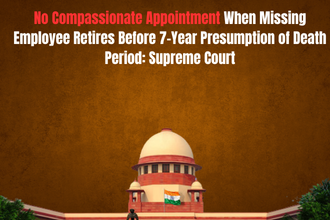In an important development concerning the legal fraternity, the Supreme Court of India has conferred the prestigious Senior Advocate designation on five retired High Court judges. The decision was taken during a full court meeting held on October 29, 2025, under the leadership of Chief Justice of India BR Gavai, along with other judges of the Supreme Court. The official notification, released on October 31, 2025, clarifies that the designation came into effect from October 29, 2025.
This move recognizes the contributions, judicial scholarship, and legal excellence demonstrated by these retired judges during their tenure on the Bench. Senior designation is one of the highest professional honors in the Indian legal system and is granted only after careful evaluation of professional merit, integrity, and contribution to the development of law.
Retired Judges Conferred Senior Advocate Status
The five retired High Court judges who have been conferred Senior Advocate designation are:
- Justice Gilani Madadali Nurmohammad
Former Judge, High Court of Bombay - Justice M. Govindaraj
Former Judge, Madras High Court - Justice Pankaj Bhandari
Former Judge, Rajasthan High Court - Justice Rakesh Kumar Jain
Former Judge, Punjab and Haryana High Court - Justice Tashi Rastan
Former Chief Justice, High Court of Jammu & Kashmir and Ladakh
Each of these judges has served in distinct legal and geographical contexts, contributing to the jurisprudence and development of regional and national legal frameworks. Their designation as Senior Advocates acknowledges their judicial experience and continuing role in shaping legal discourse in India.
Understanding the Senior Advocate Designation
The designation of Senior Advocate is governed under Section 16 of the Advocates Act, 1961. The legal profession in India recognizes two distinct categories of advocates:
| Category of Advocate | Description |
|---|---|
| Senior Advocates | Advocates recognized by the Supreme Court or High Courts as having exceptional ability, standing, or special knowledge of law. |
| Other Advocates | Those who have not been designated as Senior Advocates. |
To be conferred Senior designation, an advocate (or retired judge resuming legal practice) must:
- Demonstrate high professional skill and specialized legal expertise
- Possess a reputation for ethical conduct and integrity
- Show contribution to legal scholarship, judicial reasoning, or public service
Unlike ordinary advocates, Senior Advocates have special courtroom roles and restrictions. They are:
- Prohibited from drafting pleadings on their own
- Restricted from interacting directly with clients for case preparation
- Required to appear only with a briefing advocate
This system ensures that Senior Advocates focus on high-level arguments, interpretation, and articulation of legal principles, contributing to the intellectual depth of court proceedings.
Why Grant Senior Designation to Retired Judges?
Retired judges bring a wealth of judicial understanding and legal reasoning to the Bar. Once retired, they may return to legal practice in specific capacities (with ethical restrictions, such as not appearing before the court where they once served).
The Senior designation allows them to:
- Participate in public interest litigation, constitutional matters, and advisory legal work
- Contribute to law reform initiatives
- Mentor younger lawyers
- Assist courts in matters requiring judicial insight, such as commissions, tribunals, and arbitration
In recent years, the Supreme Court and High Courts have encouraged experienced retired judges to remain connected to active legal service to strengthen legal education, legal aid, and dispute resolution frameworks.
Role of the Full Court Meeting
The full court meeting is a formal high-level session where all sitting judges of the Supreme Court convene to deliberate on matters of judicial administration. The decision to designate Senior Advocates is made collectively to ensure:
- Transparency
- Consistency of standards
- Merit-based recognition
The Chief Justice of India plays a central administrative role, but the final decision is a collective institutional judgment of the Supreme Court.
Significance of This Development for the Legal Community
This move carries symbolic and practical significance:
1. Recognition of Judicial Excellence
The designation publicly acknowledges the judges’ contributions to legal reasoning, administration of justice, and public service.
2. Strengthening of Legal Practice
Retired judges, once designated as Senior Advocates, become valuable resources for:
- Constitutional litigation
- Policy advisory work
- Arbitration and mediation
- Academic and intellectual contributions
3. Encouragement for Judicial and Professional Standards
Such recognitions reinforce the idea that legal excellence, commitment, and integrity continue to have institutional value even after retirement.
Profiles in Brief (Contextual Overview)
While the notification does not elaborate on the individual judicial achievements, each of the designated judges carries a record of notable contributions:
- Justice Nurmohammad served on the Bombay High Court, contributing to commercial and constitutional jurisprudence.
- Justice M Govindaraj played a key role in administrative and service law matters in the Madras High Court.
- Justice Pankaj Bhandari of the Rajasthan High Court is known for judgments involving criminal procedure and constitutional principles.
- Justice Rakesh Kumar Jain participated significantly in land acquisition, service law, and public administration matters.
- Justice Tashi Rabstan, who also served as Chief Justice of the J&K and Ladakh High Court, handled complex constitutional issues arising in sensitive regional contexts.
Their re-entry into the Bar as Senior Advocates ensures that their accumulated judicial experience will continue to benefit the legal community and public institutions.
Conclusion
The Supreme Court’s decision to confer Senior Advocate designation on five retired High Court judges reflects a continuing commitment to acknowledging and preserving judicial talent within India’s legal system. By recognizing distinguished service on the Bench and re-integrating experienced judicial minds into the wider framework of legal practice, the Court reinforces the values of knowledge, professionalism, and excellence in the justice system.
As these former judges resume a new chapter as Senior Advocates, their insight and expertise are expected to enrich legal discourse, mentor the next generation of practitioners, and contribute meaningfully to the evolution of Indian law.
Also Read


